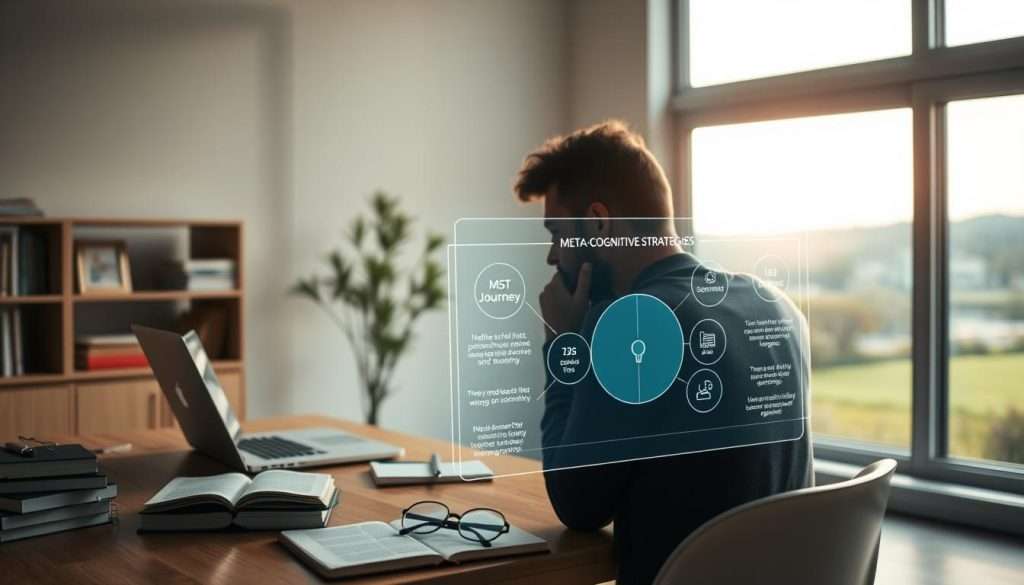Imagine being able to control your learning process, making it more effective and enjoyable. Meta cognition is the key to achieving this. It’s about thinking about your thinking, understanding how you learn, and using that awareness to improve your learning strategies.
By developing metacognitive awareness, you can take charge of your learning. This leads to better academic performance and a lifelong love for learning. It’s not just about studying harder; it’s about studying smarter.
We’re here to guide you through the process of unlocking the power of meta cognition. By the end of this article, you’ll have a clear understanding of how to apply meta cognitive strategies. These strategies will transform your learning experience.
Key Takeaways
- Understand the concept of meta cognition and its role in learning.
- Discover how metacognitive awareness can improve your learning strategies.
- Learn how to take control of your learning process.
- Find out how meta cognition can lead to better academic performance.
- Explore the benefits of lifelong learning with meta cognitive strategies.
Understanding Meta Cognition: The Foundation of Effective Learning
To unlock the full potential of learning, we must first understand meta cognition. Meta cognition is about thinking about our thinking. It involves knowing our thoughts, emotions, and how we solve problems or make decisions. By developing this awareness, we can control our learning process, making it more effective and enjoyable.
The Science Behind Thinking About Thinking
Meta cognition is based on the science of how we process information and reflect on our mental states. It’s about knowing how we think, learn, and solve problems. Studies show that those with strong meta cognitive skills do better in school and handle complex tasks better.
Key Components of Meta Cognition
Meta cognition has two main parts: metacognitive knowledge and metacognitive regulation. Understanding these parts is key to developing good learning strategies.
Metacognitive Knowledge
Metacognitive knowledge is knowing how we think and learn. It’s about knowing how to tackle different tasks and what strategies work best for us.
Metacognitive Regulation
Metacognitive regulation is controlling how we think and learn. It’s about planning, monitoring, and checking if our learning strategies are working.
| Component | Description | Example |
|---|---|---|
| Metacognitive Knowledge | Understanding of one’s own cognitive processes | Knowing that you need to re-read complex material |
| Metacognitive Regulation | Control over one’s cognitive processes | Adjusting your study plan based on progress |
Why Mastering Meta Cognition Transforms Your Learning Experience
Learning to master meta cognition changes your learning journey in big ways. It helps you understand your thinking and actions better. This lets you make smarter choices and function better overall.
As you grow your meta cognitive skills, you’ll see big improvements in learning. Let’s look at some key benefits.
Enhanced Academic Performance and Retention
Meta cognition helps you improve your learning methods. This leads to better grades and retaining information. You’ll know how to best learn and remember things.
Improved Problem-Solving Abilities
Meta cognition also boosts your problem-solving skills. It lets you think about problems in new ways. This helps you find creative solutions and see if they work.
Long-Term Benefits for Lifelong Learning
Meta cognition’s benefits last long after school. It sets a strong base for lifelong learning. As you keep improving, you’ll adapt and stay curious. This helps you face new challenges with confidence.
How to Assess Your Current Meta Cognitive Skills
Understanding your meta cognitive skills is key to learning better. It helps you know how to improve your learning strategies and results.
To begin, use various tools and methods. Self-assessment questionnaires and tools are great for this.
Self-Assessment Questionnaires and Tools
Self-assessment questionnaires help you check your meta cognitive skills. They ask about your learning habits, like how you start new tasks and track your progress. Reflecting on these helps you see your strengths and what you need to work on.
Recognizing Metacognitive Gaps in Your Learning Process
Spotting gaps in your meta cognitive skills is important for getting better. Think about times when you found learning hard. Ask yourself if you plan your study well or check your understanding often. Knowing these gaps helps you focus on improving the right skills.
Setting Baseline Measurements for Improvement
After finding areas to improve, set baseline measurements. This means setting a starting point to measure your progress. For example, track how long tasks take or check your understanding before and after new strategies. This way, you can see how you’re doing and change your approach if needed.
By following these steps, you can assess and boost your meta cognitive skills. This makes learning more efficient and fun.
Developing Meta Cognitive Awareness: First Steps
Starting your learning journey? Developing meta cognitive awareness is key. It helps you understand your thought processes and learning strategies. This way, you can make smart choices when facing challenges.
Learning to Observe Your Thought Patterns
Watching your thought patterns is the first step. By focusing on how you think and learn, you can spot areas to improve. Notice when you’re using strong thinking skills and when you’re struggling.
Journaling Techniques for Metacognitive Reflection
Journaling is a great way to boost metacognitive awareness. Writing down your thoughts and reflections regularly can help you understand your learning better. Use prompts like “What did I learn today?” or “What challenges did I face?” to help guide your journaling.
| Journaling Prompt | Purpose | Example |
|---|---|---|
| What did I learn today? | Reflect on new knowledge | “I learned about the importance of meta cognition.” |
| What challenges did I face? | Identify areas for improvement | “I struggled with understanding a complex concept.” |
Creating Thinking Checkpoints in Your Learning Process
Creating thinking checkpoints is another smart move. It means regularly stopping to check your understanding and adjust your approach if needed. Try setting these checkpoints at the end of each study session or before tackling a new topic.
By using these strategies, you’ll be on your way to improving your meta cognitive awareness. This will help you reach your academic goals.
Practical Meta Cognition Strategies to Implement Today
Now that we’ve covered the basics of meta cognition, let’s look at practical strategies to use today. These methods will help you take charge of your learning. You’ll study more effectively and see better results.
Pre-Learning Planning Strategies
Before you start learning, planning is key. You need to set clear goals and think about possible challenges.
Setting Clear Learning Objectives
It’s important to know what you want to achieve. Try to set specific, measurable, achievable, relevant, and time-bound (SMART) goals. For example, instead of saying “I want to learn Spanish,” say “I will be able to hold a 10-minute conversation in Spanish within the next three months.”
Anticipating Challenges and Solutions
Think about the obstacles you might face and come up with solutions. If you’re learning a new language, a challenge might be finding time to practice. A solution could be to use a language learning app during your daily commute.
During-Learning Monitoring Techniques
As you learn, it’s crucial to monitor your progress. This helps you stay on track and make adjustments as needed.
Self-Questioning Methods
Regularly ask yourself questions about the material. What are the main ideas? How do they relate to what you already know? This self-questioning technique helps reinforce your understanding and identify areas that need more attention.
Comprehension Checks
Periodically check your comprehension by summarizing what you’ve learned. You can do this by explaining it to someone else or by writing a summary in your own words.
Post-Learning Evaluation Practices
After you’ve completed a learning session, take time to evaluate your progress. This step is crucial for reinforcing what you’ve learned and identifying areas for improvement.
Reflection Exercises
Reflect on what worked well and what didn’t. Ask yourself what you would do differently next time. This reflection process helps solidify your learning and improves your approach for future study sessions.
Knowledge Application Tests
Test your knowledge by applying what you’ve learned to real-world situations or problems. This could involve solving practice problems, writing an essay, or completing a project that requires the new skills or knowledge.
Applying Meta Cognitive Techniques Across Different Learning Contexts
Meta cognition is a powerful tool for learning. It’s not just for one area; it can help in many. This makes learning more flexible and effective.

Enhancing Reading Comprehension Through Metacognition
Meta cognitive strategies can really boost reading skills. They help readers understand their own thought processes better. This lets them adjust how they read based on the material.
Pre-Reading Strategies
Good readers prepare before diving into a text. They look at headings, set goals, and think about what they already know. These steps help them get ready for what they’re about to read.
Active Reading Techniques
While reading, meta cognitive learners stay engaged. They summarize key points, ask questions, and connect new info to what they already know. These actions keep them focused and deepen their understanding.
Solving Complex Problems With Metacognitive Approaches
Meta cognition is key for solving tough problems. It lets learners think about how they solve problems. This reflection helps them find better ways and see where they can improve.
Problem Decomposition Methods
Breaking down big problems into smaller parts is a meta cognitive strategy. It makes problems easier to handle one step at a time. This leads to a more complete solution.
Solution Evaluation Frameworks
After solving a problem, meta cognitive learners check their answers. They look at the logic, possible biases, and other viewpoints. This makes sure their solution is solid and thought out.
Strengthening Critical Thinking With Metacognitive Awareness
Meta cognition and critical thinking go hand in hand. It’s about knowing how you think while you analyze. This boosts critical thinking skills.
Assumption Identification Techniques
Meta cognitive learners question their assumptions and look at different views. This helps them think more critically. It’s about recognizing your own biases and seeking out other perspectives.
Argument Analysis Strategies
When analyzing arguments, meta cognitive learners focus on the claim, evidence, and reasoning. These strategies help them judge the argument’s strength. It’s about critical thinking.
Overcoming Common Obstacles in Meta Cognitive Development
Starting a meta cognitive journey can feel overwhelming. But knowing the challenges ahead helps us stay focused. We might face biases, learning hurdles, and keeping new habits. Understanding these obstacles lets us find ways to keep growing.
Addressing Cognitive Biases That Hinder Metacognition
Cognitive biases can block our meta cognitive growth. Biases like confirmation bias make us stick to what we already believe. To beat this, we must be open to new ideas and question our thoughts.
For example, when reading, think about other views. Ask yourself, “What could be against this idea?” or “How might someone else see this?”
Breaking Through Learning Plateaus
Learning plateaus can be tough, but they’re part of learning. To get past them, we need to change how we learn. Self-regulation helps us adjust when we’re stuck.
Try something new or use a different resource. Sometimes, a change can help you move forward.
Creating Sustainable Metacognitive Habits
Building lasting meta cognitive habits takes time and effort. Begin with small daily practices like journaling. These habits will grow, keeping your skills sharp.
To keep these habits, find someone to hold you accountable. Share your goals with a friend or join a study group. This can keep you motivated to keep practicing.
Advanced Applications of Meta Cognitive Skills
Meta cognition changes the game for learning in teams, using digital tools, and solving complex problems. Meta cognition is a powerful tool that boosts our learning in many ways.

Metacognition in Collaborative Learning Environments
In team learning, meta cognition is key for teamwork and solving problems. It helps us understand our and our team’s thinking. This way, we can work better together, share knowledge, and reach our goals. This awareness helps us navigate complex group dynamics and keep everyone in sync.
Using Digital Tools to Enhance Metacognitive Practice
Digital tools make our metacognitive practice better by offering new ways to reflect and plan. For example, digital planners and apps help us stay organized and track our progress. By using these tools, we can learn more effectively and do better in school.
“The way we learn is changing, and meta cognition is at the forefront of this change.”
Metacognition for Creative Problem-Solving
Meta cognition is vital for creative problem-solving. It lets us think differently and consider new views. By knowing our own thinking and biases, we can approach problems with a more open and flexible mindset. This leads to innovative solutions.
By using meta cognitive skills in these advanced ways, we can reach new heights in learning. We can succeed more in school and work.
Conclusion: Your Roadmap to Metacognitive Mastery
Developing metacognitive awareness is a key to unlocking your learning potential. It helps you use cognitive strategies and improve your thinking skills. This way, you can control your learning and live a more fulfilling life.
To master metacognition, focus on self-regulation. Practice the techniques mentioned earlier. This means being aware of your thoughts, setting achievable goals, and adjusting your methods when needed.
Embracing metacognition boosts your academic performance and gives you valuable skills for life. Keep working on it, and remember that it takes time, dedication, and persistence to get better.
Now, use what you’ve learned to improve your metacognitive abilities. Stay committed, and you’ll enjoy a more effective and enjoyable learning journey.

